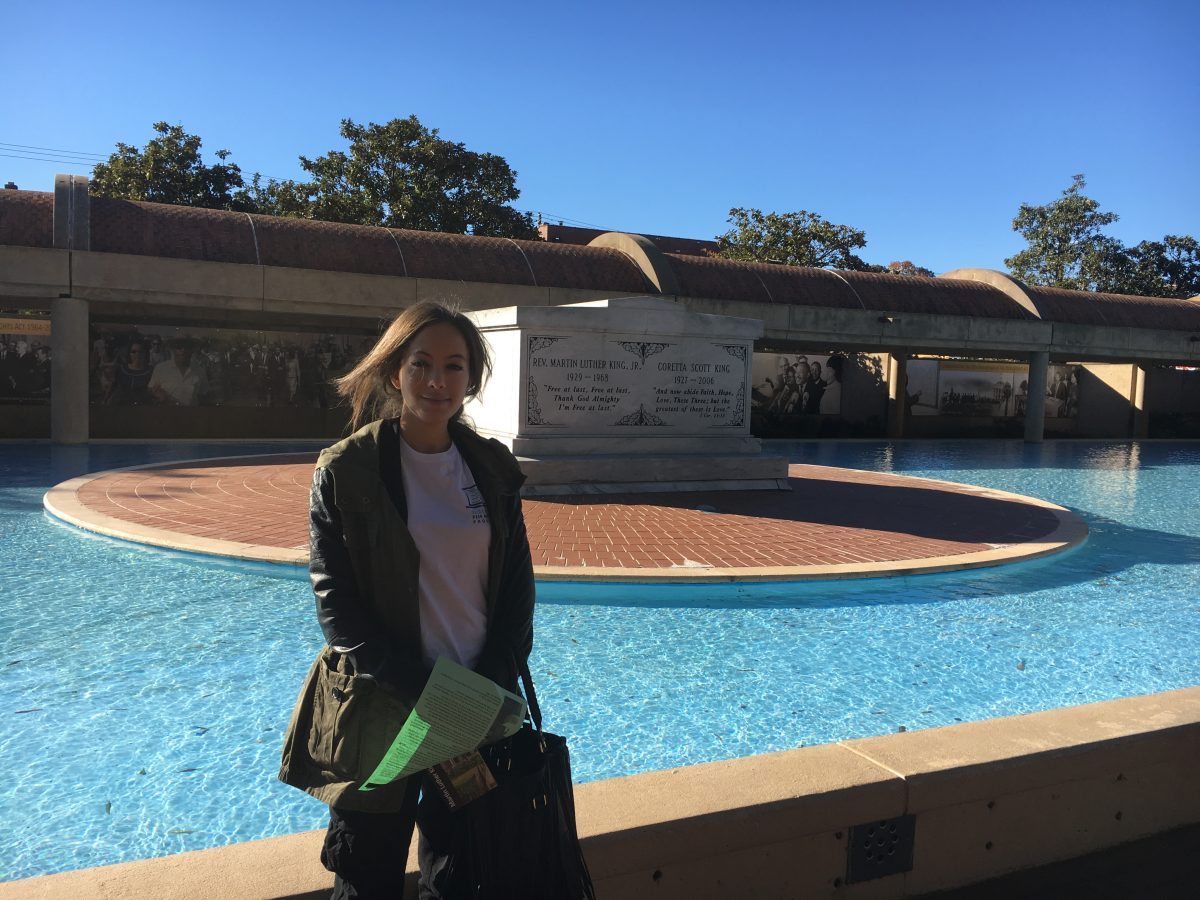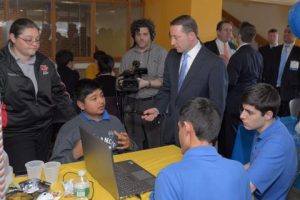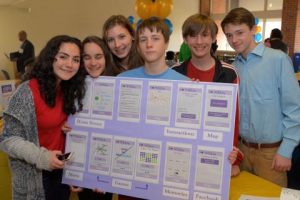By Melanie Greene
 It was an honor to attend the Faculty Resource Network’s National Symposium in Atlanta in November. I co-presented with Dr. James Lawler on inclusion programs for students with disabilities in the Seidenberg School. I spoke about the class I took with Dr. Lawler (CIS 102w Web Design for a Not-for-Profit Organization), mentoring students in AHRC’s junior high school and high school programs (they had different levels of autism; one was more severe than the other), mentoring and tutoring Adil Sanai, tutoring his students last semester in his two CIS 102w courses, the two research projects we worked on together, and being a co-moderator for the Disability Film Festival. I got the chance to speak about all of my experiences that I have had working with people with disabilities.
It was an honor to attend the Faculty Resource Network’s National Symposium in Atlanta in November. I co-presented with Dr. James Lawler on inclusion programs for students with disabilities in the Seidenberg School. I spoke about the class I took with Dr. Lawler (CIS 102w Web Design for a Not-for-Profit Organization), mentoring students in AHRC’s junior high school and high school programs (they had different levels of autism; one was more severe than the other), mentoring and tutoring Adil Sanai, tutoring his students last semester in his two CIS 102w courses, the two research projects we worked on together, and being a co-moderator for the Disability Film Festival. I got the chance to speak about all of my experiences that I have had working with people with disabilities.
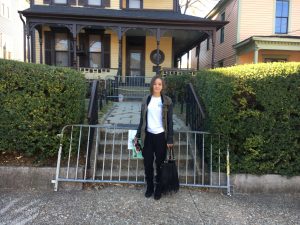 I am uplifted and inspired by Dr. Lawler’s drive and commitment to give people with disabilities access to a college education. I support everything that he is doing. I get very emotional talking about all the adventures and learning experiences I have had with Dr. Lawler – they have been life changing opportunities that affect me deeply.
I am uplifted and inspired by Dr. Lawler’s drive and commitment to give people with disabilities access to a college education. I support everything that he is doing. I get very emotional talking about all the adventures and learning experiences I have had with Dr. Lawler – they have been life changing opportunities that affect me deeply.
 During the conference, we went to three different schools: Morehouse College (an all-male college where Dr. Martin Luther King went), Spelman College (all-female college), and Clark Atlanta University (co-ed). All of the schools were beautiful, it was a privilege to visit them. I got choked up when we went to Morehouse College because Dr. King went there. I felt like I was walking through history. At the school they had a picture of President Obama delivering the Commencement speech in 2013 and I was in awe: both President Obama and Dr. Martin Luther King’s presences were there.
During the conference, we went to three different schools: Morehouse College (an all-male college where Dr. Martin Luther King went), Spelman College (all-female college), and Clark Atlanta University (co-ed). All of the schools were beautiful, it was a privilege to visit them. I got choked up when we went to Morehouse College because Dr. King went there. I felt like I was walking through history. At the school they had a picture of President Obama delivering the Commencement speech in 2013 and I was in awe: both President Obama and Dr. Martin Luther King’s presences were there.
At the conference, I got the chance to meet other professors from schools in NY, Atlanta, Hawaii, and others. I enjoyed listening to their research and learning about how we could use social media and technology platforms to teach millennials.
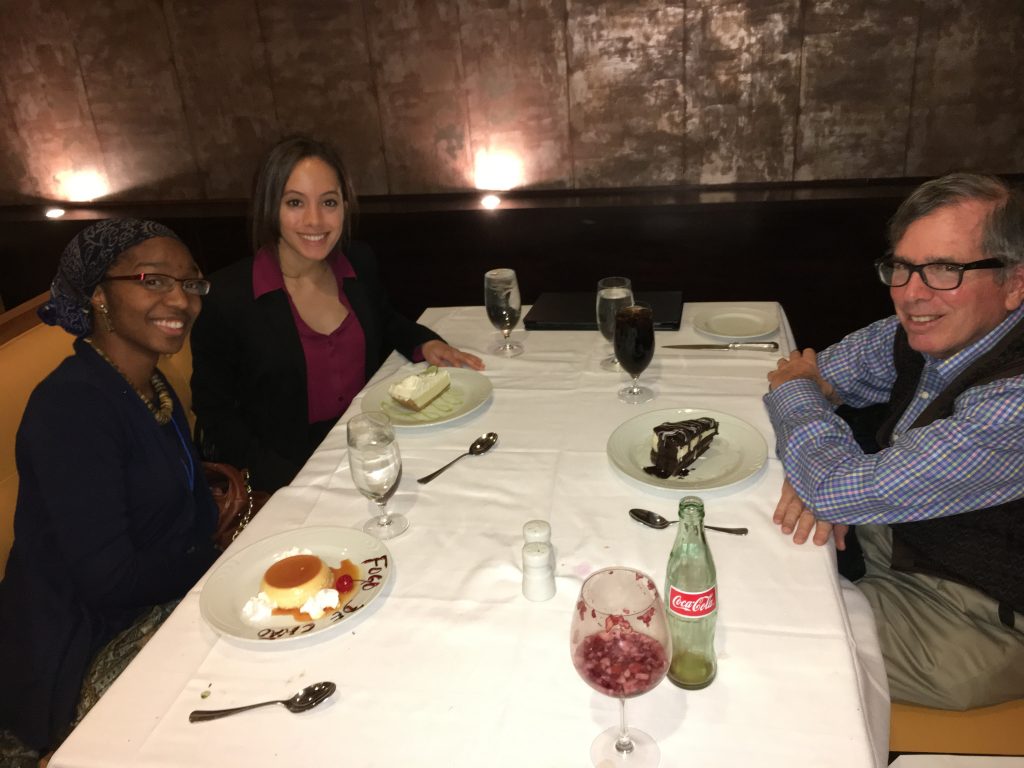
Dr. Lawler and I went to a delicious Italian restaurant one night and a Brazilian restaurant (it was my first time going to a Brazilian restaurant). We invited a professor from Spelman College that I met to join us for dinner, which was a lot of fun. One night our bus broke down which was an experience in itself. The bus was literally like the engine that could. When 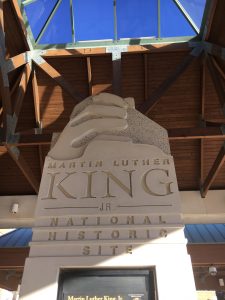 we broke down one professor started to play Bob Marley “Don’t Worry” and we all chimed in – it was priceless. The bus kept trying to get us all back to the hotel, but unfortunately it failed. We had to walk back to the hotel. On our final day we visited the Martin Luther King Jr. National Historic Site. I was overwhelmed with emotion, I had the chills the whole time – history was brought to life. To walk where Dr. King walked, to stand in the area where he preached in Ebenezer Baptist Church, to see the pole in the firehouse where he played on as a child, and lastly to see his grave was indescribable.
we broke down one professor started to play Bob Marley “Don’t Worry” and we all chimed in – it was priceless. The bus kept trying to get us all back to the hotel, but unfortunately it failed. We had to walk back to the hotel. On our final day we visited the Martin Luther King Jr. National Historic Site. I was overwhelmed with emotion, I had the chills the whole time – history was brought to life. To walk where Dr. King walked, to stand in the area where he preached in Ebenezer Baptist Church, to see the pole in the firehouse where he played on as a child, and lastly to see his grave was indescribable.
My favorite part of the trip was having the privilege to present with Dr. Lawler. This certainly is a weekend that I will never forget. I thank Dr. Lawler and the Seidenberg School for giving me the opportunity to attend this conference. I will always cherish the incredible memories from this trip.


